 French army paratroopers patrol near the Eiffel tower in Paris, France, March 30, 2016 as France has decided to deploy 1,600 additional police officers to bolster security at its borders and on public transport following the deadly blasts in Brussels.
French army paratroopers patrol near the Eiffel tower in Paris, France, March 30, 2016 as France has decided to deploy 1,600 additional police officers to bolster security at its borders and on public transport following the deadly blasts in Brussels.
The killing of an 85-year-old Roman Catholic priest on Tuesday is the latest continuum of ISIS-linked attacks terrorizing Europe.
The death of Father Jacques Hamel in Rouen comes two weeks after another suspected ISIS lone-wolf killed 84 people celebrating Bastille Day in Nice.
And unlike in the aftermath of the attack on France’s Charlie Hebdo office in January 2015 and the string of attacks in Paris in November 2105, which saw unity across France, the country’s opposition politicians have responded to the most recent attacks with strong criticism of the government’s security record.
“All this violence and barbarism has paralyzed the French left since January 2015,” Nicolas Sarkozy, who is expected to enter a conservative primary for next year’s presidential election, told Le Monde newspaper.
“You clearly have instances, for example in Brussels and Paris, where the perpetrators of those attacks were crossing borders with impunity,” Fran Burwell of the Atlantic Council said in an interview.
“The question then becomes how do you get two national police forces to cooperate and share information?”
The attacks in France, coupled with violence in Germany and Belgium, show that Europe’s efforts to work together to fight terror have been ineffective.
“What has changed in Europe is that everyone knows that this cooperation [among European states] needs to be built,” Burwell said. “That is going to be a long road. You don’t flip a switch and it is suddenly there. That is a big challenge for Europe.”

CIA Director John Brennan speaks at a forum about “CIA’s strategy in the face of emerging challenges” at The Brookings Institution in Washington, U.S. July 13, 2016.
“This scenario has been a long time coming for Europe,” Rick Nelson, an analyst at the Center for Strategic and International Studies told USA Today. “I don’t see this letting up anytime soon.”
During a July 13 discussion at the Brookings Institution on identifying emerging security threats, CIA Director John Brennan emphasized that Europe needs to accelerate its plan to form a unified security front much like what the US did after the 9/11 attacks.
“We learned after 9/11 some very, very painful lessons about how the different parts of the US government whether it be FBI, CIA, NSA and others needed to work better together,” Brennan said.
“And that was difficult and painful but we were one country and we had one leadership and we were directed to do that … when you look at Europe and you look at the European Union there are currently 28 members, soon to be I guess 27, that have separate legal systems, separate information technology systems, different practices as far as how they follow through on their privacy and civil liberty obligations,” Brennan added.
“There is still a fair amount of work that needs to be done but I do think it is going in the right direction but it needs to accelerate.”
And as the Atlantic Council’s Ashish Kumar Sen notes, growing discontent among some far-right political parties about the influx of refugees could make it difficult for German Chancellor Angela Merkel and French President François Hollande to win reelection in 2017.
No comments:
Post a Comment